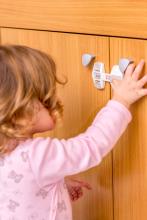Safe Use and Storage of Household Chemicals
Many household products are safe to use and have around. However, some products can cause harm if they are improperly used, stored, or thrown away. Environmental Protection Agency's (EPA) Safer Choice website has healthier alternatives for you, your family, and the environment.
Learn more about recycling and composting to reduce waste.
Only buy what you need
Research online and talk with experts (like local hardware stores) to determine what products you need. If you purchase what you need for your project, you won't need to store or get rid of the excess products.
Store chemicals away from children
Children are more vulnerable to being harmed by chemicals since they are smaller and put a lot of items in their mouth. Store products high out of the reach of children or in locked cabinets.
Keep hazards, like mercury and medications, away from kids
- Clean up mercury spills properly. Do not vacuum mercury.
- Household medications should be kept locked or out of reach of children.
Follow product labels
Product labels contain instructions on how to use that specific product. Pay attention to product warnings, such as never mixing ammonia and bleach as it creates chlorine gas, which can be deadly.
Dispose of your hazards properly
Review the Department of Natural Resources' (DNR) guidance on management of household hazardous waste to learn about a variety of waste collection and exchange programs, including when you should take products to a store for disposal (like used engine oil and compact fluorescent lightbulbs) or when you can throw out the products. The following options may help in removing old products.
Clean Sweep is a Department of Agriculture Trade, and Consumer Protection (DATCP) grant program that provides reimbursement to communities that collect and dispose of household hazardous wastes, agricultural pesticides, and prescription drugs. View the 2018 Clean Sweep communities list.
Local Solid Waste Department: Your local solid waste department may have more information on disposal guidelines and collection schedules in your area.
Other Options: Some items may need to be disposed of outside of Clean Sweep or your local solid waste department.
- Earth911 has a Recycling Center Search that is specific to ZIP codes.
- Habitat for Humanity (PDF) has some information on disposing specific items. Some items are Madison-area specific, but others are more general.
- DNR's Household Pharmaceutical Waste site has information on drop-off sites and scheduled collection events for medications.
- Dose of Reality has information on take-back locations for medications.

